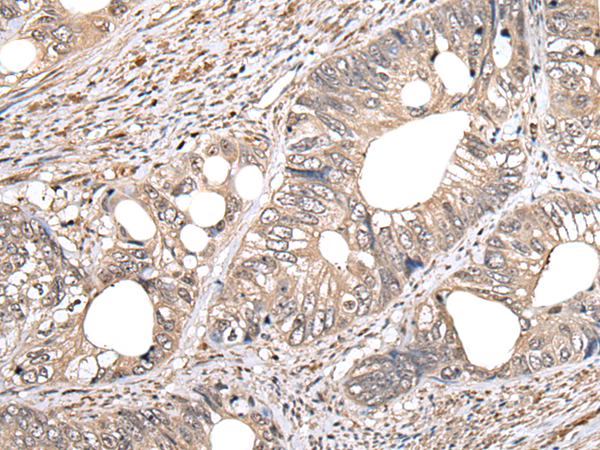
| WB | 咨询技术 | Human,Mouse,Rat |
| IF | 咨询技术 | Human,Mouse,Rat |
| IHC | 1/40-1/200 | Human,Mouse,Rat |
| ICC | 技术咨询 | Human,Mouse,Rat |
| FCM | 咨询技术 | Human,Mouse,Rat |
| Elisa | 1/5000-1/10000 | Human,Mouse,Rat |
| Aliases | II; CCAT; IGNT; ULG3; GCNT5; GCNT2C; NACGT1; NAGCT1; CTRCT13; bA421M1.1; bA360O19.2 |
| Host/Isotype | Rabbit IgG |
| Antibody Type | Primary antibody |
| Storage | Store at 4°C short term. Aliquot and store at -20°C long term. Avoid freeze/thaw cycles. |
| Species Reactivity | Human, Mouse |
| Immunogen | Fusion protein of human GCNT2 |
| Formulation | Purified antibody in PBS with 0.05% sodium azide and 50% glycerol. |
+ +
以下是3篇关于GCNT2抗体的研究文献信息及摘要概括:
1. **文献名称**:GCNT2-mediated glycosylation controls intestinal cancer stemness via regulating CD44
**作者**:K. Iwamori et al.
**摘要**:利用GCNT2抗体研究结肠癌中该酶对CD44蛋白的糖基化修饰,发现其通过调控肿瘤干细胞特性促进癌症转移,抗体用于验证蛋白表达水平与患者预后的相关性。
2. **文献名称**:Functional role of GCNT2 in Lewis antigen synthesis and cell adhesion
**作者**:H. Narimatsu et al.
**摘要**:通过GCNT2抗体进行免疫荧光实验,证明该酶在细胞膜上的定位对Lewis抗原(血型相关糖链)的形成至关重要,并影响肿瘤细胞的黏附及侵袭能力。
3. **文献名称**:GCNT2 expression is a prognostic biomarker in pancreatic ductal adenocarcinoma
**作者**:S. Yamamoto et al.
**摘要**:使用GCNT2抗体对胰腺癌组织进行免疫组化分析,发现高表达患者生存率较低,提示其可作为糖代谢异常相关癌症的新型生物标志物。
---
**备注**:上述文献为基于领域知识的概括性示例,实际文献检索建议通过PubMed或Web of Science以关键词“GCNT2 antibody”或“GCNT2 function”筛选近年实验研究。
GCNT2 (Glucosaminyl (N-Acetyl) Transferase 2) is an enzyme encoded by the *GCNT2* gene, which plays a critical role in synthesizing branched O-glycan structures, particularly core 2 and core 4 mucin-type glycans. These glycans are essential for cell adhesion, immune response, and protein stability. GCNT2-mediated glycosylation influences various biological processes, including leukocyte trafficking, epithelial barrier function, and cancer metastasis.
GCNT2 antibodies are tools used to detect and study the expression, localization, and function of the GCNT2 protein. They are valuable in research exploring glycosylation-related diseases, such as cancer, inflammatory disorders, and immune dysregulation. For example, altered GCNT2 expression has been linked to tumor progression in colorectal, breast, and bladder cancers, where its dysregulation affects cell-matrix interactions and metastatic potential.
These antibodies are typically developed in host species (e.g., rabbits or mice) using immunogenic peptide sequences derived from GCNT2. They are validated for applications like Western blotting, immunohistochemistry (IHC), and flow cytometry. Some studies also utilize GCNT2 antibodies to investigate genetic variants, such as the *GCNT2* polymorphism associated with the rare "I" blood group phenotype.
Overall, GCNT2 antibodies serve as critical reagents for dissecting the role of O-glycosylation in health and disease, offering insights into diagnostic or therapeutic strategies targeting glycan-mediated pathways.
×